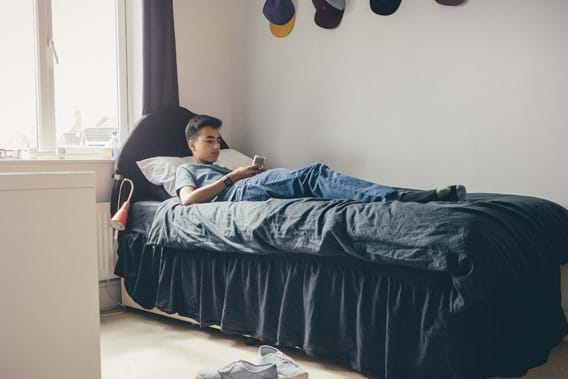
Home Alone: Is Your Child Old Enough?

Written by: Nanny Secours
Your child is getting older and wants a little more autonomy? You are debating whether they are ready to stay home alone? You have no clue where to start or which ground rules to establish?
Here is some useful information to help you nurture your child’s growing sense of independence and reducing your anxiety every time you leave the house.
What does the law say?
Legally speaking and according to the Canada Safety Council, no law in Quebec stipulates whether or not a child can be left home alone. Parents are trusted to decide whether or not their child is mature and responsible enough to spend a maximum of two to three consecutive hours without adult supervision. However, if the child were to get injured or if a neighbour file a complaint, the Director of Youth Protection (DYP) could intervene and the parent may face accusations of negligence for a child under 12. Children over 12 years old are considered to be responsible for their own actions and the parents cannot be prosecuted.
It comes down to common sense. Should you leave a 7-year-old at home alone? The answer is no. But, in the case of 9- to 12-year-old children who are responsible, confident and mature, I would say yes. Always consider this isn’t for an extended period, we are talking two or three hours at most and not a whole weekend!
Plus, ask yourself the following questions:
1. How old is my child?
A 10-year-old can stay home alone after school, but not a 6-year-old.
2. Is my child mature, independent and responsible enough?
Not only age matters. You should also consider your child’s character and maturity. Some 9-year-olds might be more mature than an 11-year-old.
3. Does my child follow my rules?
If your child generally follows house rules and respects what’s allowed and what’s not, it’s a good sign he or she can be trusted.
4. Does my child feel ready? Does he or she ask to stay home alone?
If your child displays the necessary aptitudes and shows interest to stay home alone―because all his or her friends are doing it―you can start preparing them gradually.
5. Are you comfortable leaving your child alone?
If you are confident, your child will be too. However, if you feel they are too young and you are too worried or anxious, then wait. You can start listing rules and mentally getting ready.
You and your child feel ready to take the leap
For everything to go smoothly, I suggest two assignments to properly prepare before sitting down for a chat with your child. It is your duty to see to their safety after all.
The first:
- Identify the times of day your child will be alone (before school, lunch time, after school, Saturday afternoon) and opt for short periods of time to start;
- Determine how long they will be alone (10 minutes, 30 minutes, 45 minutes, 1 hour, but NO LONGER THAN 2 TO 3 HOURS STRAIGHT);
- Determine whether they will have to watch their brother or sister;
- Prepare a list of phone numbers (dad, mom, grandparents, neighbour, police, etc.) and place it near the phone.
Your first task is completed; let’s move on to the second, which is harder. I suggest you sit down with your spouse to establish clear and precise rules. These will constitute the ground and safety rules to follow while you are gone.
Safety Rules
The key rules that apply at all times:
- Tell your child the exact time of your return;
- The child should never answer the door;
- Establish an emergency plan in case of a fire (draw a plan of the house and identify the emergency exits);
- Prepare a drawer with flashlights and a first aid kit;
- All dangerous objects, such as matches or fuel, must be stored in a safe place out of reach;
- Lighting candles, using knives or turning on the oven is strictly forbidden;
- Taking a bath or going to the pool without an adult is forbidden;
- If the child is able to answer the phone, make sure they use this key sentence: “My parents are busy right now, they will call you back later”;
- If your kid walks to and from school, come up with a secret password only known to your child and people you trust. For instance: if a neighbour offers your child a ride home rather than walking, your child will ask them for the password. If the person doesn’t know it, your child will refuse to get in the car. They must then promptly notify you or a teacher.
Ground Rules
You have to decide what you allow or forbid when you’re not home. For instance:
- Can they invite friends over?
- What can they eat? Will you prepare a snack for them?
- Can they use the microwave (watch out for burns)?
- Can they play with their electronics (tablet, computer, console, etc.)?
- What should they do to keep busy?
- Tidy their room
- Read
- Listen to music
- Do homework
- Play board games
Once the rules are established, I often suggest parents call a “Family Meeting” and sit down at the kitchen table with snacks and juice. Explain the expectations you have and the mandatory rules to follow. You can even have your child sign a little contract. Show your trust by giving your child a set of house keys and then practice locking and unlocking the front door. Your child will feel proud and independent.
To allow your child to build confidence when alone, I strongly recommend you take a gradual approach, slowly increasing their solo time by 15 minutes every week.
The following are examples of ways you can leave the house few times a week:
Week 1 (approximately 15 minutes): walk the dog, go to the convenience store, or get a coffee.
Week 2 (approximately 30 minutes): get a few groceries.
Week 3 (approximately 45 minutes): go for a walk.
Week 4 (approximately 1 hour): go shopping, visit your parents or a friend.
Week 5 (approximately 1 hour and 15 minutes): go to a yoga class, go to the pool or the gym.
After practising for about 2 months, there won’t be any problem with your leaving the house for those 2 or 3 hours. A nice lunch or catching the latest flick are a couple of examples that fit nicely into this time frame.
Remember to trust your child’s capacities; foster his or her growing independence through opportunity. Once the rules are clear and kids know what to expect, the ball is in their court. They will realize it’s a privilege and sign of trust to be left alone.
Julie Malenfant, Special Education Teacher
Founder of Ateliers de Julie
Member of Réseau Nanny secours
Sources:
- Youth Protection Act
- Canada Safety Council


